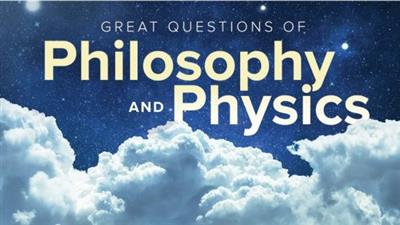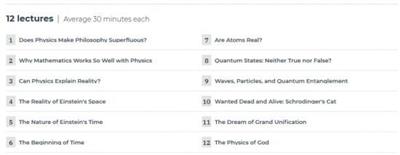
Video: .MP4, AVC, 1500 kbps, 854x480 | Audio: English, AAC, 96 kbps, 2 Ch | Duration: 12x30 mins | 3.28 GB
Course No. 60000 | Lecturer: Steven Gimbel, Ph.D. | + PDF Guidebook
No field of the humanities is so closely tied to physics as philosophy. Since ancient times, philosophers have puzzled over the nature of space, time, and matter-inquiries that led to the flowering of physics in the 17th century with Isaac Newton and other pioneers of the Scientific Revolution. Since then, the spectacular success of modern physics might imply that philosophy is no longer relevant to the field. Far from it! Surprising discoveries in the atomic and cosmic realms have opened a floodgate of new philosophical questions, such as:
Show Full Description
Is time travel possible? Time travel is an idea that would have seemed absurd to a classical physicist like Newton. But it appears to be a real option according to Albert Einstein's general theory of relativity-raising the prospect of time machines, along with a host of paradoxes including whether the past can be altered.
Is the universe fine-tuned for life? The more we learn about the universe, the more it looks tailor-made expressly for us. Does this imply a Creator? On the other hand, where else could we live except in a universe conducive to life? This suggests that countless other universes may exist with quite different properties.
Is Schrödinger's cat dead or alive? A thought experiment proposed by the physicist Erwin Schrödinger features a cat whose life hangs in the balance subject to a quantum event, which is inherently probabilistic and unobservable. The implications have led to startling proposals about the nature of reality.
Treating these and other puzzles with a light and accessible touch, award-winning teacher and philosopher Steven Gimbel of Gettysburg College guides you through the concepts, theories, and speculations that underlie our understanding of reality in The Great Questions of Philosophy and Physics. In 12 wide-ranging, half-hour lectures, Professor Gimbel covers many of the fundamental ideas of modern physics, highlighting the role of philosophy in setting ground rules, interpreting results, and posing new questions.
The only prerequisite for the course is a desire to think critically and abstractly-in other words, philosophically. No prior background in science, mathematics, or philosophy is assumed. Trained as a philosopher of physics, Professor Gimbel deftly introduces the major players, sketches the intellectual terrain, and outlines the most important debates. He also tells a few jokes, displaying the playful side of his profession.
Wrestle with Profound Questions
Dr. Gimbel's humor is on display when he brings up the topic of atoms. "Do atoms exist?" he often asks his classes. "Of course they do," his students invariably tell him. "What about Santa Claus?" Dr. Gimbel counters. "Does he exist?" The point is that our evidence for atoms is indirect, much like the clues for Santa's visit (packages under the tree and missing cookies). While the analogy should not be stretched too far, there is a long tradition in the philosophy of science that regards unobservables as being metaphysically out of bounds. This view is called empiricism. There is an equally venerable tradition, called realism, that views strong evidence for entities such as atoms as proof of their existence, in spite of the fact that they can't be observed directly.
In The Great Questions of Philosophy and Physics, you wrestle with tricky debates like this, assessing the arguments on both sides. Inevitably, you will find yourself persuaded by one position and then having second thoughts when you hear the arguments against it, which is a mark of the subtlety of the underlying philosophical issues.
Consider these questions, which you address in the course:
Why is math so effective? Mathematics is the hallmark of a rigorous science such as physics. But why should that be? Is the world a mathematical system, as some philosophers contend? Or is mathematics simply our most powerful, logical tool for making sense of the relations between things in nature?
Is space a thing or a relation? Newton believed that space is a kind of amphitheater that the universe occupies. His rival, Leibniz, argued that space is just a set of relations. If the contents of the universe were removed, there would be nothing left, not even "space." Einstein cast this debate in a remarkable new light.
What is scientific truth? Philosopher Nancy Cartwright points out that the laws of physics are idealized and do not describe reality. If fundamental laws don't lead us to the truth, then what does? It may be that we have to settle for statements that are true enough to give the best explanation-and no more.
Probe the Surprising Nature of Reality
For a 19th-century physicist trying to formulate physical laws, an empirical approach was common sense. "Seeing is believing" was hard to argue with. The deep reality at the root of nature was interesting to contemplate, but hardly accessible at the time. However, in the 20th century, a revolution swept physics, eventually giving us two comprehensive theories of reality: the standard model of particle physics, which unifies the strong, weak, and electromagnetic forces that control events in the atomic realm; and general relativity, which covers gravity, the force that operates without limit across the universe.
Both theories are extraordinarily successful at predicting events at their respective scales. Both imply an underlying reality that is counterintuitive, if not bizarre. Both have major philosophical implications. And each is incompatible with the other, hinting that an eventual theory that unifies both will sketch a reality of utmost strangeness-as proposals such as string theory do.
One of philosophy's most important roles is clearing up misconceptions. There are plenty of those surrounding modern physics, as you learn in this course. For example, the Heisenberg uncertainty principle is often cited as an epistemological claim. That is, for a given subatomic particle, the uncertainty principle limits our knowledge of simultaneous values for a pair of quantities, such as position and momentum. You can know one or the other, but not both. But that's not the whole story. The uncertainty principle is really a metaphysical claim: precise, simultaneous values for both quantities simply don't exist. According to one theory, after you know one value, the other disappears into a parallel universe!
You finish the course with a venture into philosophy's oldest branch: theology. Today's theologians sometimes invoke discoveries in physics to argue that the most logical hypothesis is that God created the universe in a big bang, analogous to the account in the Book of Genesis. You weigh arguments for and against this view, closing The Great Questions of Philosophy and Physics with the greatest question of all: How did it all begin?
Screenshots

download скачать link:
https://rapidgator.net/file/39869631dba89ddbf340ea3ac3d7c826/bbkj8.TTC.Video..The.Great.Questions.of.Philosophy.and.Physics.part1.rar.html https://rapidgator.net/file/a2d6cd23b39112f0f2200a731b1df85c/bbkj8.TTC.Video..The.Great.Questions.of.Philosophy.and.Physics.part2.rar.html https://rapidgator.net/file/67d6b4abbf9d6172839a937bdc22aeef/bbkj8.TTC.Video..The.Great.Questions.of.Philosophy.and.Physics.part3.rar.html https://rapidgator.net/file/98b64e8e618e261e4c4a8d1ce9d9a44d/bbkj8.TTC.Video..The.Great.Questions.of.Philosophy.and.Physics.part4.rar.html https://uploadgig.com/file/download скачать/40e67869d8334302/bbkj8.TTC.Video..The.Great.Questions.of.Philosophy.and.Physics.part1.rar https://uploadgig.com/file/download скачать/41b2471feE9e94a2/bbkj8.TTC.Video..The.Great.Questions.of.Philosophy.and.Physics.part2.rar https://uploadgig.com/file/download скачать/a7719De161076ea5/bbkj8.TTC.Video..The.Great.Questions.of.Philosophy.and.Physics.part3.rar https://uploadgig.com/file/download скачать/c8B34545cE8a3b58/bbkj8.TTC.Video..The.Great.Questions.of.Philosophy.and.Physics.part4.rar
Links are Interchangeable - No Password - Single Extraction

